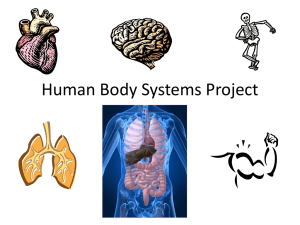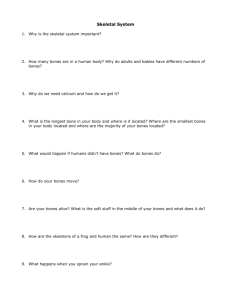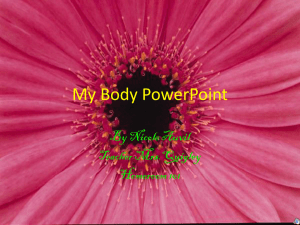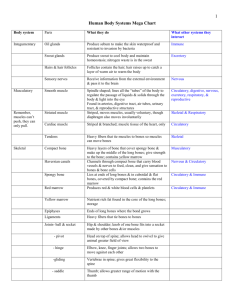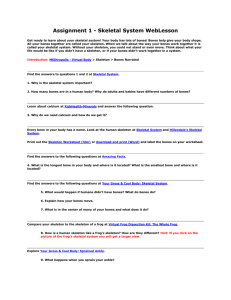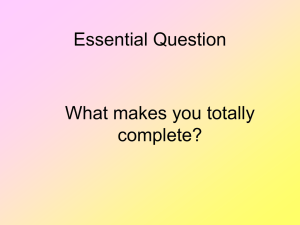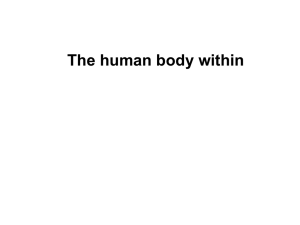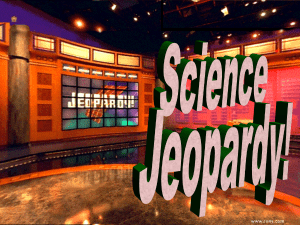Body Systems Web Unit Worksheets
advertisement
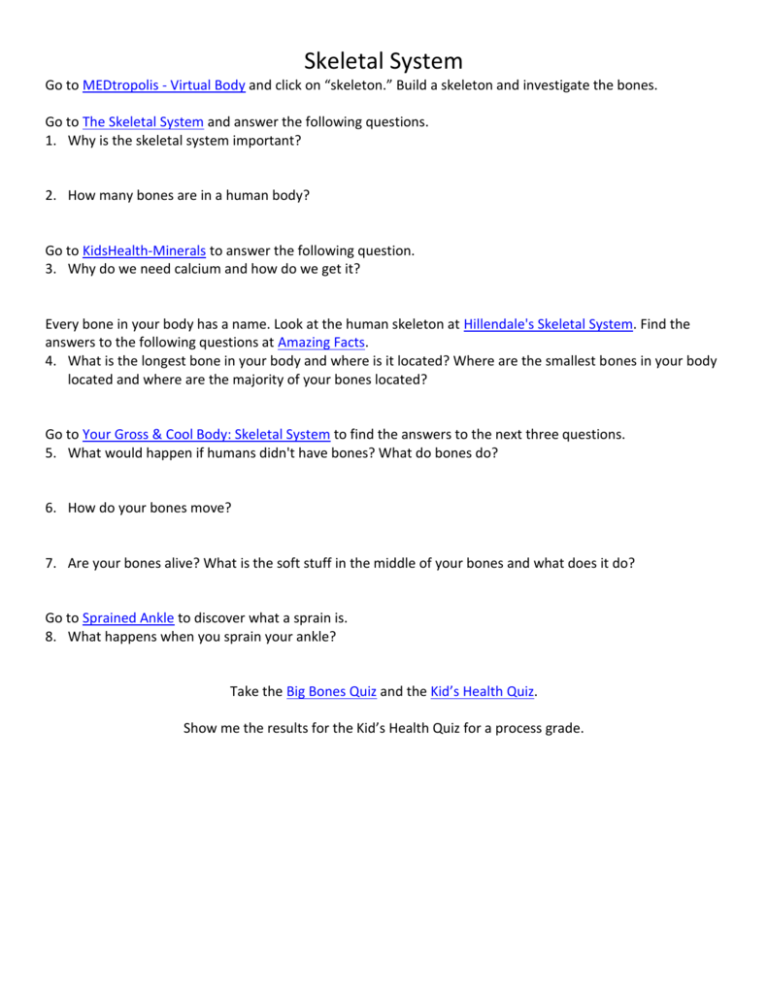
Skeletal System Go to MEDtropolis - Virtual Body and click on “skeleton.” Build a skeleton and investigate the bones. Go to The Skeletal System and answer the following questions. 1. Why is the skeletal system important? 2. How many bones are in a human body? Go to KidsHealth-Minerals to answer the following question. 3. Why do we need calcium and how do we get it? Every bone in your body has a name. Look at the human skeleton at Hillendale's Skeletal System. Find the answers to the following questions at Amazing Facts. 4. What is the longest bone in your body and where is it located? Where are the smallest bones in your body located and where are the majority of your bones located? Go to Your Gross & Cool Body: Skeletal System to find the answers to the next three questions. 5. What would happen if humans didn't have bones? What do bones do? 6. How do your bones move? 7. Are your bones alive? What is the soft stuff in the middle of your bones and what does it do? Go to Sprained Ankle to discover what a sprain is. 8. What happens when you sprain your ankle? Take the Big Bones Quiz and the Kid’s Health Quiz. Show me the results for the Kid’s Health Quiz for a process grade. Muscular System Muscles are attached to your bones to help them move. Without muscles you couldn't move at all! Muscles also give us strength. Muscles are constantly doing simple things like helping you blink or breath. They also do harder chores like help you run, jump, and play. So how do they work? Explore Your Multi-talented Muscles. Then look at Muscular Introduction , and Your Gross & Cool Body: Muscular System and answer these questions: 1. Do you have more bones or more muscles? How do you know? 2. How do muscles work? List and describe the job of each type of muscle. a. b. c. 3. Write 10 interesting facts about muscles. a. _________________________________________________________________________ b. _________________________________________________________________________ c. _________________________________________________________________________ d. _________________________________________________________________________ e. _________________________________________________________________________ f. _________________________________________________________________________ g. _________________________________________________________________________ h. _________________________________________________________________________ i.__________________________________________________________________________ j.__________________________________________________________________________ 4. Draw and label the different muscles and describe what each type does. Respiratory System What's a respiratory system? Breathing and the way your body uses oxygen is called respiration. We must breath to live. The organs used to help you breathe and use oxygen make up the Respiratory System. Learn about your respiratory system at Thinkquest and at the Franklin Institute. You may want to also look at the video at How the Body Works - The Respiratory System at KidsHealth and the drawing for Asthma. You also may want to watch the video at this Asthma website. 1. Draw and label your Respiratory System. Investigate coughing and sneezing at Washington Post Health. 2. Compare a cough and a sneeze. What are the similarities and differences? Look at The Respiratory System. 3. What is the Respiratory System ? How does it work? Share at least two interesting facts about the Respiratory System. 4. Describe how the air passes through the respiratory system, the four major areas it travels through, and what happens in each place. Take the Respiratory System Quiz. Show me your results at the end for a process score. Digestive System The food you swallow goes on a long journey through your body. The digestion process begins as you take your first bite of food and ends as your body disposes of the unusable parts. The digestive system mixes, mashes, and breaks down foods into nutrients that your body can use. What is not needed leaves your body. Introduction: MEDtropolis - Virtual Body > Digestive Tract > Guided Tour If possible, look at the video at How the Body Works - The Digestive System at KidsHealth. Then check out The Real Deal on the Digestive System. Find out about what happens when you eat something and the path it takes in its journey through your body at Your Gross and Cool Body: Your Digestive System. 1. Draw and label a picture of the digestive system and trace the route that food takes through your body. 2. What mixes with the food when it is in the stomach? What does it do to the food? 3. How long does food stay in each area of the digestive system? Share two interesting facts you learned about the digestive system. Take the quiz at Digestive Quiz. Show me the results. Circulatory System Your heart works constantly to keep your blood moving throughout your body. Your pulse is part of the circulatory system. In an average lifetime, the heart beats more than two and a half billion times, without ever pausing to rest. Introduction: MEDtropolis - Virtual Body > Human Heart > Narrated Tour Explore The Circulatory System. Then look at Circulatory System and All About Your Heart at KidsHealth. 1. Where is the heart located in your body? What does it do? 2. Explain how blood travels through your body. 3. What is the difference between veins and arteries? 4. In the table below, beside each job, check off which type of blood cell does that job. What Does Your Blood Do? Red Cells White Cells Plasma Carry oxygen to your lungs Find germs Eat foreign things in your body Take carbon dioxide away Kill infections Carry food to your lungs Take waste away Take the Cardiovascular Quiz and show me the results. You can also review with the Hillendale Circulatory Quiz . Platelets Nervous System Your brain controls everything you do. It communicates with your body, keeps your body functioning, and helps you think. It helps you do things you think about and also does things you DON'T think about. How does it communicate and keep your body working so smoothly? Introduction: MEDtropolis - Virtual Body > The Human Brain > Narrated Neurons Check out these resources and find out!Check out your Brain at Your Gross & Cool Body: Brain and your Nervous System at Your Gross & Cool Body - Nervous System. 1. What is your brain made of? 2. How much does it weigh? 3. How does your brain communicate with your body? 4. What is your nervous system? 5. What are nerves and what do they do? To find out how the brain controls everything, go to Neuroscience for Kids: Lobes of the Brain. 6. Each part of the brain is responsible for specific actions. What are they? Put check marks in the appropriate columns. Frontal Lobe Parietal Lobe Occipital Lobe Making plans with your friends Planning what to eat Talking on the telephone Feeling cold during recess Remembering your vacation Figuring out how to make a web page Enjoying at a movie Playing soccer Feeling the soft fur on a puppy Finding a light switch in the dark Listening to music Watching a movie Feeling pain when you stub your toe Take the KidsHealth Nervous System Quiz and show me the results. Temporal Lobe
